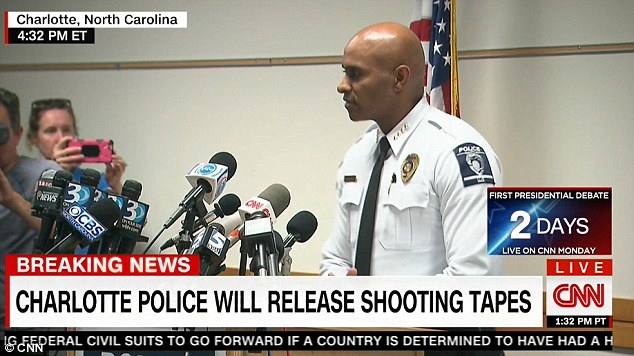Cannabis Led to Keith Scott’s Deadly Encounter With Charlotte Police

After days of protests, the Charlotte-Mecklenburg Police Department decided to release some of the video footage of the police killing of Keith Lamont Scott. The department was facing increasing pressure from politicians and protestors alike. Plus, its response was being compared to the police shooting of Terence Crutcher in Tulsa, Okla., where authorities released video footage of the incident promptly.
At the same time, however, officials tried to shift the focus to drugs—like many similar cases of police brutality. A press conference announcing the release of the video on Sept. 24 was the first time authorities mentioned that marijuana possession was a factor in the encounter, reports Slate.
A statement from the police department says that plainclothes officers observed Scott “rolling what they believed to be a marijuana ‘blunt.’” The officers apparently did not consider this “a priority” until they “observed Mr. Scott hold a gun up.” This gave them “probable cause to arrest him for the drug violation and to further investigate Mr. Scott being in possession of the gun.”
Police officials have insisted that Scott was armed and posed a threat, while residents say otherwise. Nevertheless, the videos released do not definitively show a gun or a blunt.
“When I look at the dashcam footage, I don’t see anything there, in my opinion, that would lead to him losing his life,” an attorney the Scott family told the New York Times.
One of the protesters said marijuana possession should not have lead to Scott losing his life: “Even if they thought he was smoking weed, why in any world would that warrant him being gunned down?”
Marijuana is decriminalized in North Carolina; possession of up to a half an ounce of cannabis is a Class 3 misdemeanor, punishable by a maximum fine of $200. Possession of .5 to 1.5 ounces is a Class 1 misdemeanor, punishable by a maximum of 45 days in jail and a $1,000 fine.
Drug use or possession is often a factor in deadly police encounters. In the case of Crutcher, the police officer’s attorney said she thought he was under the influence of PCP. While authorities said they found PCP in his car, they haven’t said whether it was found in his system.
Last year, officials in Waller County, Tex. tried to blame the death of Sandra Bland on cannabis use after a toxicology report found THC in her system. The presence of THC in Michael Brown’s toxicology report also played into the narrative that drug use somehow justifies violent police encounters, such as in Ferguson, Mo., where Brown was gunned down in 2014.
Dr. Carl Hart, a neuroscientist who studies drugs, wrote: “I find this line of reasoning insulting and offensive. It seeks to misuse the science of behavioral pharmacology to excuse reprehensible acts perpetrated by the state or state proxies.”
If you enjoyed this Freedom Leaf article, consider subscribing today!

